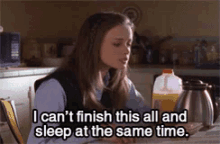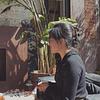So, you procrastinated, again. The exam's tomorrow and you're probably on the verge of a breakdown, panicking because you don't know what to do, or where to start. I've been there too.
This isn't a time to make aesthetic-Pinterest worthy notes, or write down flashcards or listen to your "productivity playlists". So, strap yourselves in, caffeine at the ready, and lock in to suffer one night--because there's no room for being irrational.
Let this serve as a reminder to maybe start earlier next time, but right now, here's how to study smarter and not harder, when you've got only a day left before your exams.
Let us slide into your dms 🥰
Get notified of top trending articles like this one every week! (we won't spam you)Do Not Panic

Image Credit: JESHOOTS.COM from Unsplash
Stress will do you no good. It'll only consume your focus and your energy. Therefore, instead of being all over the place, take a deep breath, and know that you cannot control the type of questions in the test tomorrow, but you can control whatever preparation you're going to do now, however raw and messy it may be, and that is a million times better than overthinking your way through the whole day. Accept the fact that the time you have is limited, and use whatever resources you have available: previous flashcards, notes you've made in class, even textbooks.
Take the Quiz: What Student Stress Relief Tactic Do You Need to Try Next?
If you're a student in desperate need of a new way to de-stress, try this out to see what to explore!
Identify The High-Priority Topics

Image Credit: Карина Низаметдинова from Unsplash
Skim through your syllabus and pinpoint all the topics which are most likely to appear in the exams. Do not try to attempt every topic, because that isn't possible now. Lightly flick-through any past papers of the subject, and check the weightage of the themes. Prepare the high-yielding concepts first, and then if time permits, try to do the rest.
Use What You've Got

Image Credit: GoodNotes 5 from Unsplash
You don't have the time and the energy to make any more notes or experiment with flashcards. Instead use anything you've got, and make the best out of it. You could even convert the notes you've got into mental questions spontaneously, because that helps the mind recall better. Prioritize all of your weaker zones, don't waste time on what you do know already.
Get Just Enough Sleep and Take Breaks

As someone who is deprived of sleep in almost every social science exam, aim to get at least 3-4 hours of sleep, if not more than 5. All the stuff you've learned will be consolidated only if you get a little bit of rest, or else, if you don't take a break, you'll probably fumble on the topics you know well in the exam too. You can use methods like Pomodoro too, which usually means working for 25 minutes followed by a five minute break. So, you won't burnout, and you'll get your rejuvenation too.
Final-Push Strategies Based On Subjects
Here are brief plans, subject-wise, on how you can study efficiently when the clock is ticking:
- STEM(Physics, Chemistry, Math, Engineering)

Image Credit: Anoushka Puri from Unsplash
Practice the valuable illustrations and problems of a certain type. Moreover, as I said above, converge your focus on the type of questions most likely to appear. Tattoo your brain with all the important reactions, theories and conceptual experiments. Flip through all of the solved examples in the end, because they'll give you an idea of how questions will likely be asked in the exam.
If your school/institution provides you with material and resources like guidebooks and worksheets, it'd be best to refer to them completely, because of the repeated question-asking patterns. Lastly, I'd advise you not to focus more on the fancy bonus kind questions, because most of the marks are made up of basic or medium level concepts anyway, so master those instead. The harder ones will only tank your time.
- Biology/Psychology

Image Credit: Tara Winstead from Pexels
These are content heavy subjects so, mugging up is a bit mandatory. However, since we're short on time, skim lightly, but attentively, focussing the last ounces of your brain-power on reading through the chapters. After you're done with that, don't try to cram everything at once, focus on the bigger systems, biological processes, and terminologies.
For psychology, try remembering which psychologist did what, all the theories, experiments and all the keywords--which'll help you to make condensed charts and mindmaps, summing up the functions and characteristics of a given topic in short.
Additionally, I'd recommend you to use pre-made sets of flashcards online or quizlets, for quick revision during the final hour.
- Literature/Languages

Image Credit: Thought Catalog from Pexels
These are subjects in which I wouldn't put a good word down for skimming, because these are pretty thematic and expression-based. Master the chapter summaries, and analyses, and the key-scenes for the prose. Most importantly, know the character-sketches, arcs, transformations, and their motives. Another tip is that when reading the chapters, highlight the important lines and make questions out of them.
For poetry, focus on the poem structure and body(sonnet, free verse, haiku), the rhyme scheme, the poetic devices and the central idea and the overall tone of the poem. Then, jot down a critical-analysis of what you understood from the poem. On the topic of grammar, proofread some sentences with grammatical errors and spot them. This is one of my favourite practical methods to study grammar.
And finally, for writing skills and creative work, browse some sample essays, comprehensions, analytical paragraphs, formal and informal letters--and perfect all of their formats.
- Social Science

Image Credit: Pixabay from Pexels
You don't need to learn by heart all the dates and names--emphasise on the big picture. Over here, clarity over detail is our mantra, so go over all the major events, their cause and consequences, theories and concepts. Jot down quick-comparison charts for often-similar topics which may be confusing.
Furthermore, if there are case studies, don't try to read out the entire section, just familiarise yourself with 2-3 examples of each. Examiners prefer understanding and knowledge over how encyclopaedic-one time mugged up knowledge.
Last-Minute Study Plans Based on the Type of Learners
- Visual Learners:

Image Credit: Antoni Shkraba Studio from Pexels
As the name suggests, you learn best by seeing. Study methods suited for you would be mind-mapping, diagrammatic representation and flow-charts. You could also watch video lectures to understand the more complex concepts, or simply highlight the key terms while scanning your notes, so if you glance through the material once again, you'll easily be able to recall the key idea of what you studied. Colour-coding and bookmarking related topics also helps!
- Auditory Learners

Image Credit: Vlada Karpovich from Pexels
Auditory learners absorb most information effectively through listening. The most common technique for such learners would be reading chapters out loud, and explaining the gist of them to yourself. Another could be to quickly listen to a revision audio or podcast on your topic, preferably on 2x speed to save your minutes. Along with that, there are many text-to-speech converters available online as well.
- Reading/Writing Learner

Image Credit: Tirachard Kumtanom from Pexels
They learn primarily by reading and writing the content. Use resources like previous year questions, sample papers and summaries. You could try re-writing key-points and definitions into condensed bullet points.
As a read and write learner myself, I like converting complex, text-heavy material into a neat and absorbable points which I can understand easily. Focussing on understanding the concepts rather than boning up and cramming, helps a lot, as you can then elaborate and enunciate clearly, if it is asked in the examination.
- Kinesthetic Learner

Image Credit: Andrea Piacquadio from Pexels
Kinesthetic learners are the "lemme do it" types. They digest content with hands-on activities, experiments--basically anything that encourages movement. Pace while reading aloud, solve problems instead of reading them through, fill out logbooks or charts--just do anything!
Conclusion
At the end of the day, this may not be the most perfect set-up ever, but you can still survive through it. Take a deep breath, drink a strong coffee, and just start. Show up for yourself this time, and remember to let this be a wake-up call, and not an every time exam routine.
















